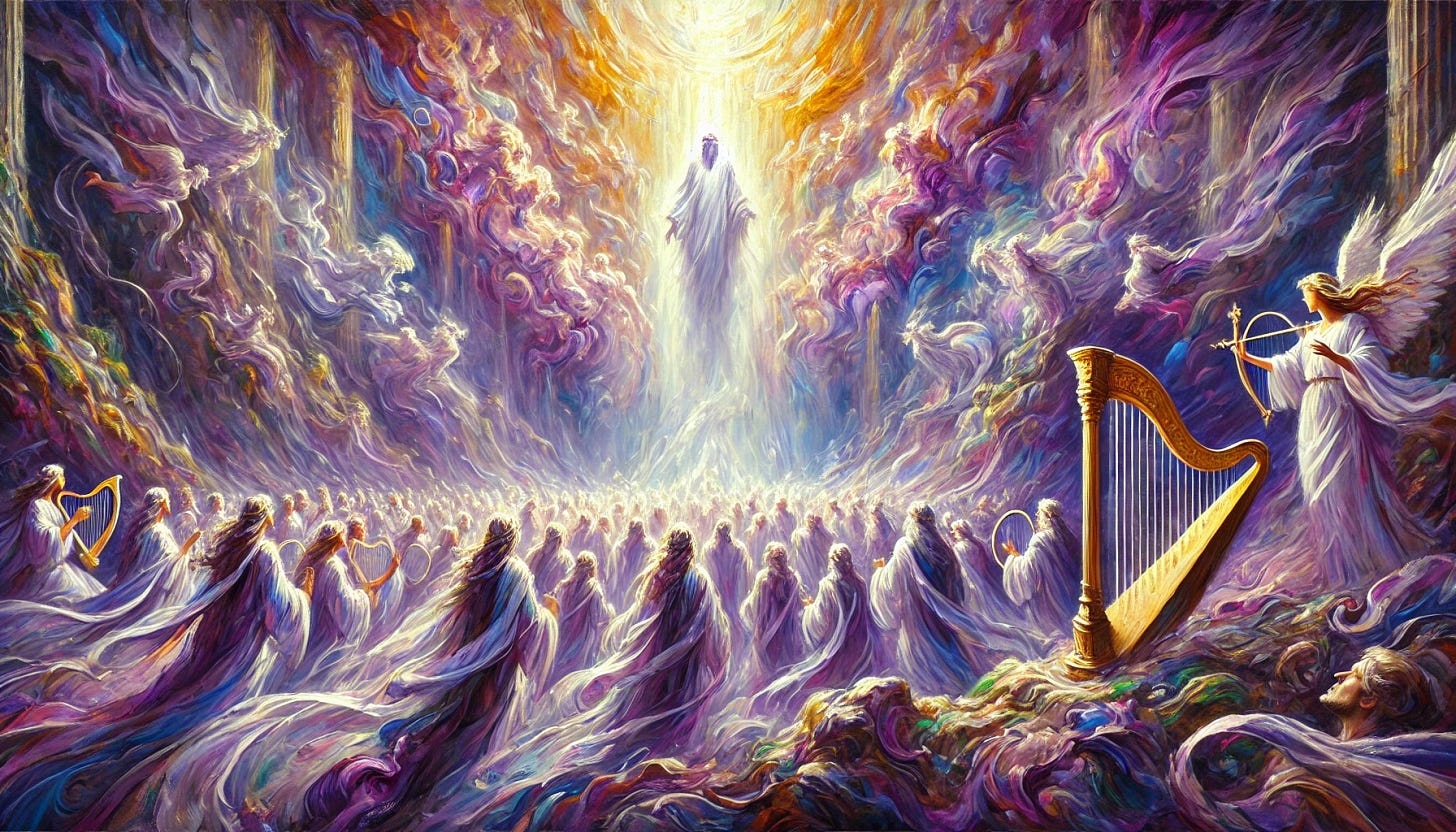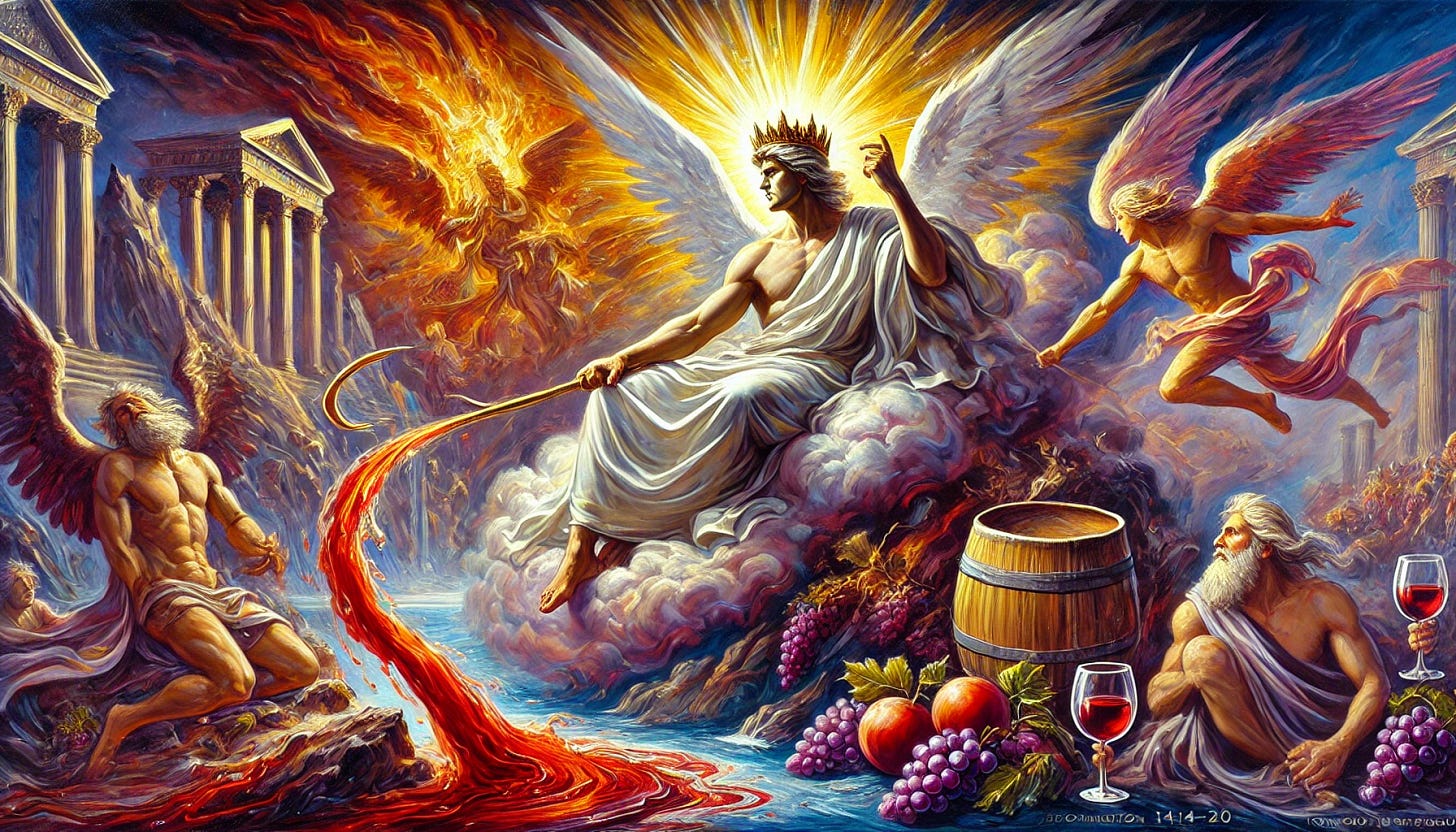Click here to read the passage.
Click here to read the notes and questions for Revelation 13:11-18.
Main Idea: At the return of the Lamb, the enemies of Christ will be eternally punished while eternal rest and reward are promised for those who have their faith in Jesus.
Revelation 14 stands in contrast to Revelation 13.
In Chapter 13, the beast (the antichrist) rises to power, wars against the saints and overcomes them, takes authority over the whole earth, and puts to death those who will not worship him or bear his mark.
In Chapter 14, we see the warrior Lamb standing on Mount Zion with his army of saints. They sing the song of redemption and follow after the Lamb in holiness and purity. They have the promise of heaven and glory whereas the followers of the beast have the certainty of judgment and hell.
This chapter is a preview of coming attractions. Pastor Warren Wiersbe writes: “Better to reign with Christ forever than to reign with Antichrist for a few years.”
The one you follow is crucial. The one you worship is decisive.
Revelation 14:1-5
Faithful followers of Jesus have a glorious future
The redeemed will stand with him securely (14:1)
The redeemed will sing to him loudly (14:2–3)
The redeemed will be sanctified through him completely (14:4–5)
Regarding the singing in Verses 2-3, such joy and celebration is the natural response of those who are saved by a salvation we do not deserve or could ever earn. Christianity has always been a singing faith. It will remain so for all eternity!
Revelation 14:6-13
God will be just in his treatment of all persons
Daniel Akin writes in “Exalting Jesus in Revelation”:
“A biblical portrait of hell and eternal torment is painted for us in Verses 10–11 that are simply too plain to be denied. Revelation 14:6–20 could not be more politically incorrect for an age that tolerates anything and everything. However, one thing is certain: the God of all the earth will do right. A day of reckoning is coming for all of us. We will not all be treated the same though we will all be treated justly and righteously. No one will stand before God at judgment and say, ‘You did me wrong. You were unfair.’ Such a day will never come.”
While our salvation is a settled issue for believers, we are still challenged in Verse 12 to persevere. In the midst of horrible tribulation and great wickedness, we cannot help but wonder, “Is our devotion to the Lamb truly worth it?” Verse 13 provides a resounding “Yes!” to that question.
Note who gives this affirmation in Verse 13: The Holy Spirit! This is the only time the Holy Spirit is quoted in Revelation except in 22:17.
Revelation 14:14-20
Jesus Will Pour Out His Wrath on the Earth in Righteous Judgment
John sees the Son of Man on a white cloud with a golden victor’s crown on His head. This is the Lord Jesus. Here is our Lord in dazzling brilliance and majesty, awesome authority and power.
Verse 16 is brief and simple: “So the one seated on the cloud swung His sickle over the earth, and the earth was harvested.” The divine, heavenly “terminator” has come. Judgment day has arrived and it cannot be delayed. The ministry of mercy is over. Sowing the seed of the gospel is at an end. Tomorrow or “someday” is now today.
From Akin:
“In the ancient Near East in John’s time, grapes were trampled or stomped by foot in a trough that had a duct leading to a lower trough or basin where the juice was collected. The splattering of the juice as the grapes are stomped vividly pictures the splattered blood of those who will be destroyed. Treading grapes in a winepress was a familiar figure of divine wrath and judgment.
“The war that will truly end all wars will no doubt be worldwide, yet its focal point will be on the Plain of Esdraelon near Mount Megiddo (about 60 miles north of Jerusalem). This is what we know as Armageddon. Here will take place the most horrific and destructive battle the world will ever know. It is more a slaughter than a battle. Blood will flow or be splattered up to a horse’s bridle, or about four feet high. It will run for 1,600 furlongs or stadia—184 miles. This is hyperbole suggesting massive, unimaginable slaughter and destruction.”
Notes
Verse 1 … 144,000: Most dispensationalists see these 144,000 as the same group mentioned in Revelation 7:4: Jewish believers who have trusted in Christ as their Messiah during the great tribulation. (ESV Study Bible)
Verse 3 … “Their song belongs only to those who have experienced the Lamb’s redemption. This is another indication that 144,000 should not be taken as a literal number; they represent those who have been redeemed.” (ESV Study Bible)
Verse 4 … “Verse 4 can be a bit tricky if we forget Revelation is apocalyptic, symbolic language. We are introduced to virgins who have not defiled themselves with women. This, without question, is symbolic of their fidelity and allegiance to the Lamb whom they follow wherever He goes. In other words, they are spiritually faithful to their God in a world awash in idolatry and immorality. They have remained morally and spiritually pure in their devotion of and love for the Lamb. No other God would they consider. No other lover would they entertain. They follow Christ and only Christ, for He redeemed them. He set them free from slavery to sin. He purchased them from the enslavement and bondage to sin.” (Akin)
Verses 6-7 … Flying “directly overhead” refers to that point in the sky where the sun reaches its apex. This angel will be at the highest point and speak with a loud voice. All will see him and all will hear him. He preaches the everlasting gospel. This is the only time an angel is said to preach the gospel!
Verse 8 … Ancient Babylon in Mesopotamia (modern-day Iraq) was once a great empire and known for its decadence, gross immorality and idolatry. In Revelation, Babylon represents antichrist’s worldwide political, economic and religious empire. Founded by Nimrod (Genesis 10:9), Babylon was the site of the first organized system of idolatrous and false worship (Genesis 11:1–4). The tower of Babel was its most pronounced expression.
Questions
Why do you think the concept of divine wrath has fallen out of favor with many who consider themselves to be Christians?
Why has Christianity always been (and always will be, based on this passage) a faith that sings?
Why is creation often the best starting point in sharing the gospel with unbelievers today? (See Verse 7).
What would you say to someone who believes that, in the end, everyone goes to heaven? How does this passage correct that belief?
In Verse 12, how does John describe the endurance of the saints, and what can we learn about maintaining faith and obedience in the face of trials?
Why are those who die “in the Lord” blessed? (See Verse 13)
Whom has God placed in your life with whom you need to plead to flee the wrath and judgment of God?






All you write is so good! This is excellent! May save and use with my pagan friends though your presentation is far more eloquent than my “insistence mode.” Bless you and yours!!!